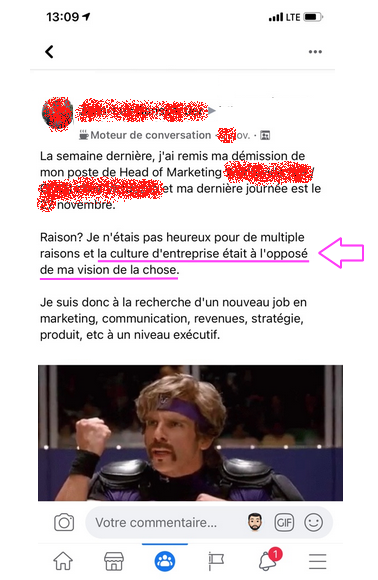Embodying organizational values in times of growth, when things are going well, is one thing. Assuming them in times of crisis, against all odds, is another.
While some organizations have shown a great deal of goodwill, others have demanded the same standard of work from their employees, regardless of the fact that the entire planet is going through a pandemic.
Is it a coincidence? Over the past month, I have been surprised to see highly competent professionals in my LinkedIn and Facebook news feeds announce their resignation, because they do not recognize themselves or no longer recognize themselves in the culture of their company.
Here is an example:

Which, when translated to English, looks like :
Last week, I resigned my position as Head of Marketing (…) and my last day is November (…).
Reason? I was not happy for multiple reasons and the corporate culture was the opposite of my vision of the thing.
So, I’m looking for a new job in marketing, communication, revenue, strategy, product, etc. at an executive level.”
When I questioned the author of the publication to understand the reasons for his departure, he replied that his former employer had “a culture of performance before the human” and tolerated “the disrespect of people”.
More and more resignations
This could be an anecdotal case, arising from specific circumstances. However, when we asked Gabriel Tremblay, HR Marketing, Employer Brand and Employee Experience Manager at the Sept24 communications agency, to share his 2020 employer brand update with us, he immediately confirmed the impression that dissonance was starting to develop within certain organizations.
There have never been more senior positions that have changed jobs than during the pandemic, not because people lost their jobs, but because they felt their employer had mismanaged the crisis on a human level.”
Companies need to rethink their organizational values, believes the HR Marketing Manager.
It must no longer have a dichotomy between a company’s core values and its employer brand. If employees did not always take the time to reflect on the core values of their employer before, there really is a new current.”
Goodwill as an attraction strategy
This is not a new phenomenon. The importance of corporate culture in retaining talent has long been known. In 2018, a LinkedIn survey revealed that 71% of professionals preferred to share the values of their company than to get a salary increase.
The pandemic has allowed professionals to know if their employers were sincere when they said they care about their physical and mental well-being.
Employers have everything to gain in nurturing their organizational culture. According to a 2017 study from the National Bureau of Economic Research, 92% of executives surveyed believe that improving their culture would increase their firm’s value.
In the coming year, Gabriel Tremblay advises companies to put employee experience at the customer experience service.
If the employer brand was once more tied to recruitment and then prioritized employee experience, we can note how happy employees help companies generate more sales! Even if you are a B2B employer, the company that buys your product or chooses you as a supplier will prioritize a partner that looks after its employees!”




